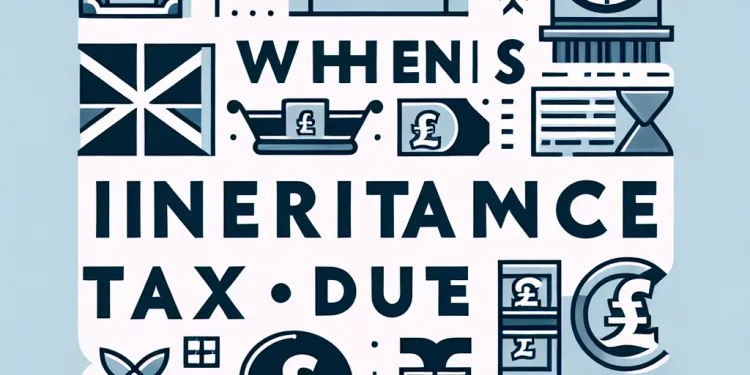
Find A Professional
More Items From Ergsy search
-

Can an inheritance tax bill be challenged or appealed?
Relevance: 100%
-

Do unpaid tax debts affect Inheritance Tax calculations?
Relevance: 90%
-

Is the tax refund amount taxable?
Relevance: 87%
-

Would a wealth tax replace other taxes in the UK?
Relevance: 82%
-

How does a wealth tax differ from an income tax?
Relevance: 80%
-

Can my tax refund be applied to my future tax obligations?
Relevance: 77%
-

Could a wealth tax encourage tax avoidance?
Relevance: 76%
-

What is the wealth tax in the UK?
Relevance: 75%
-

Does owning property abroad affect UK inheritance tax?
Relevance: 74%
-

What is inheritance tax in the UK?
Relevance: 74%
-

How does inheritance tax affect non-UK domiciled individuals?
Relevance: 73%
-

What is the Wealth Tax in the UK?
Relevance: 71%
-

How is the tax refund amount calculated?
Relevance: 71%
-

When is inheritance tax due to be paid?
Relevance: 69%
-

What Happens to Tax Debt After Death? (UK Laws)
Relevance: 69%
-

Can a wealth tax be levied annually?
Relevance: 68%
-

Are there any countries currently implementing a wealth tax?
Relevance: 66%
-

Higher Income Tax - How to Claim Pension Tax Relief | Extra 20% Boost
Relevance: 66%
-

How will dividend taxation change in April 2026?
Relevance: 66%
-

How can I plan efficiently to mitigate inheritance tax?
Relevance: 64%
-

How might these changes affect taxpayers on PAYE?
Relevance: 63%
-

Where can I find more detailed information on inheritance tax?
Relevance: 63%
-

How is a wealth tax typically calculated?
Relevance: 62%
-

What is the role of an executor in handling tax debts?
Relevance: 62%
-

HMRC Tax Refund letters
Relevance: 62%
-

Can a wealth tax impact economic behavior?
Relevance: 62%
-

Why doesn't the UK have a wealth tax?
Relevance: 61%
-

How do economists view the impact of wealth taxes?
Relevance: 61%
-

Has the UK ever had a wealth tax?
Relevance: 61%
-

How do I claim my tax refund from HMRC?
Relevance: 61%
-

What happens if I do not claim my tax refund?
Relevance: 61%
-

What are the challenges of implementing a wealth tax?
Relevance: 60%
-

What is inheritance tax in the UK?
Relevance: 60%
-

Could a wealth tax affect economic growth in the UK?
Relevance: 59%
-

Are firefighter pension benefits taxable?
Relevance: 59%
-

Is there any inheritance tax exemption for spouses or civil partners?
Relevance: 59%
-

What is a Wealth Tax?
Relevance: 59%
-

Would a wealth tax apply to foreign assets?
Relevance: 59%
-

Are these grants taxable?
Relevance: 59%
-

Has any political party in the UK supported a wealth tax?
Relevance: 58%
Understanding Inheritance Tax in the UK
Inheritance tax (IHT) in the UK is a levy on the estate of someone who has died, including all property, possessions, and money. The standard rate is 40% on the value of the estate above a certain threshold, which is currently £325,000. However, the tax rules can be complex, and there are various reliefs and exemptions that may apply. It's not uncommon for disputes to arise regarding the calculation or application of inheritance tax.
Challenging an Inheritance Tax Bill
If you believe an inheritance tax bill is incorrect, you have the right to challenge it. The process generally begins by contacting HM Revenue and Customs (HMRC) to discuss your concerns. The executor of the estate or the individual who made the inheritance tax return can provide additional information or documentation if there are errors or misunderstandings in HMRC's assessment. It is essential to act quickly, as there are time limits for challenging tax assessments. Typically, you must challenge the IHT calculation within two to four years from the date of death, depending on the circumstances.
Grounds for Challenging Inheritance Tax
Several grounds exist for challenging an inheritance tax bill. Common reasons include incorrect property valuations, failure to apply available exemptions or reliefs, such as the Residence Nil Rate Band or Business Relief, or errors in calculating the available allowances. Additionally, if there are legal disputes over the will itself or the distribution of the estate, it may impact the tax calculations and provide grounds for challenge.
The Appeals Process
If initial negotiations with HMRC don't resolve the issue, the next step is to file a formal appeal. The appeal must typically be lodged within 30 days of receiving HMRC's assessment or decision. This involves completing the appropriate forms and submitting them to HMRC, setting out the reasons for the appeal and providing supporting evidence. If HMRC still disagrees, the case can be taken to the First-tier Tribunal (Tax) for an independent decision. The tribunal has the authority to overturn HMRC's decision if it finds in your favor.
Professional Assistance
Challenging an inheritance tax bill can be a complex and daunting process. It is often beneficial to seek professional advice from a solicitor or tax advisor with experience in inheritance tax matters. They can provide valuable guidance on the merits of your case, assist with preparing documentation, and represent you throughout the appeals process. Their expertise may increase the chances of a successful outcome and ensure that all available reliefs and exemptions are considered.
Conclusion
It is possible to challenge or appeal an inheritance tax bill in the UK. The process involves negotiations with HMRC and, if necessary, a formal appeals process. Understanding your rights and seeking professional advice can be instrumental in navigating this complex area. By acting swiftly and providing comprehensive information, you can effectively address any inaccuracies or disputes within the inheritance tax assessment.
Understanding Inheritance Tax in the UK
Inheritance tax is a kind of tax in the UK. You pay it on the things a person leaves behind when they die, like their house, belongings, and money. If what they leave is worth more than £325,000, you might have to pay 40% in tax on the amount over that. The rules can be tricky, and sometimes people don't agree on how much tax they should pay.
Challenging an Inheritance Tax Bill
If you think the tax amount is wrong, you can say so. Start by talking to HM Revenue and Customs (HMRC). They are the people in charge of this tax. The person handling the will or the tax can show HMRC any mistakes. It’s important to act fast because you only have a few years to do this. Usually, you have between two to four years after the person dies.
Reasons to Challenge Inheritance Tax
You can challenge the tax for different reasons. Maybe they got the value of a house wrong, or they forgot to count some special rules that reduce tax, like the Residence Nil Rate Band or Business Relief. Sometimes, if there are arguments about the will or who gets what, it can affect the tax too.
The Appeals Process
If talking to HMRC doesn’t work, you can appeal. You need to do this fast, within 30 days after HMRC tells you their decision. You fill out forms and explain why you think they are wrong, with proof. If HMRC still disagrees, you can ask an independent group called the First-tier Tribunal (Tax) to look at it. They can change HMRC’s decision if they agree with you.
Getting Professional Help
Fighting a tax bill can be hard. It helps to talk to a lawyer or tax expert who knows about this tax. They can help you understand your case, fill out papers, and talk to HMRC for you. Having an expert might make it easier to win and make sure you don’t pay too much tax.
Conclusion
You can fight an inheritance tax bill in the UK. It starts by talking to HMRC and might include a formal appeal. Knowing your rights and getting expert help is important. Acting quickly and having all the right information helps solve any problems with how much tax you need to pay.
Frequently Asked Questions
What is an inheritance tax?
An inheritance tax is a tax imposed on individuals who inherit the estate of a deceased person.
Can an inheritance tax bill be challenged?
Yes, an inheritance tax bill can be challenged if there are grounds to believe it was calculated incorrectly or unfairly.
On what grounds can an inheritance tax bill be appealed?
An inheritance tax bill can be appealed on grounds such as incorrect asset valuation, miscalculation, or exemption eligibility.
Who can appeal an inheritance tax bill?
Typically, executors of the estate or beneficiaries who are directly affected by the tax can appeal the bill.
What is the process for appealing an inheritance tax bill?
The process usually involves submitting a formal appeal to the relevant tax authority, outlining the reasons for challenging the bill.
How long do I have to appeal an inheritance tax bill?
The time limit to appeal an inheritance tax bill varies by jurisdiction, but it is often within 30 to 90 days of the notice date.
What documents are needed to appeal an inheritance tax bill?
Documents such as the original tax assessment notice, valuation reports, financial statements, and legal opinions may be required.
Is legal assistance necessary when challenging an inheritance tax bill?
While it's not always necessary, obtaining legal assistance can help in understanding the complexities of tax laws and strengthening the appeal.
Can mistakes made in property valuation affect the inheritance tax bill?
Yes, incorrect valuations can lead to inaccurate tax assessments, which can be challenged.
Is there a difference between inheritance tax and estate tax?
Yes, an inheritance tax is paid by the beneficiary, while an estate tax is levied on the deceased's estate before distribution.
Can new evidence affect the outcome of an inheritance tax appeal?
Yes, new evidence, such as updated appraisals or newly discovered assets, can significantly impact the appeal.
What happens if an appeal is successful?
If an appeal is successful, the tax authority may reduce the tax bill or issue a refund if the tax has already been paid.
What are common reasons for disputing an inheritance tax bill?
Common reasons include incorrect asset valuation, misclassification of estate items, and errors in applying exemptions or deductions.
Are there any fees associated with appealing an inheritance tax bill?
There may be fees for filing an appeal or for legal services, and these can vary by jurisdiction.
What if an appeal is denied?
If an appeal is denied, further options may include mediation or legal proceedings, depending on the jurisdiction.
Can interest accrue on an unpaid inheritance tax bill during an appeal?
Yes, interest may continue to accrue on any unpaid amounts during the appeal process.
How can errors be avoided in inheritance tax calculations?
Accurate record-keeping, professional appraisals, and consulting tax experts can help prevent errors.
Can an appeal be made online for an inheritance tax bill?
In some jurisdictions, an appeal can be filed online, but it depends on the specific procedures of the tax authority.
Do changes in tax law affect existing inheritance tax assessments?
Changes in tax law can affect assessments if they are retroactively applicable or impact ongoing appeals.
What role does a probate court play in inheritance tax disputes?
A probate court may have jurisdiction over certain aspects of the estate and can influence or decide on related tax disputes.
What is an inheritance tax?
Inheritance tax is money you pay to the government when someone dies and leaves you money or things. You pay this tax on the valuable things you get, like a house or money in a bank.
Here are some ways to understand it better:
- Ask for help: Talk to a trusted adult if you have questions.
- Use pictures: Look for pictures or videos that explain inheritance tax.
- Take your time: Read slowly and ask questions if you're unsure.
An inheritance tax is money you have to pay when you get things from someone who has died. This is a special tax on what you inherit from them.
Can you question an inheritance tax bill?
Yes, you can. If you think the inheritance tax bill is wrong, you can ask for it to be checked again. Here are some steps to help you:
- Talk to a tax expert to understand more.
- Use simple online tools or apps that explain tax in easy language.
- Ask someone you trust to help you understand the bill.
Remember, it's okay to ask questions and get help!
Yes, you can challenge an inheritance tax bill. This means you can say it is wrong if you think it was not done correctly or fairly.
How can you say an inheritance tax bill is wrong?
You can ask for a new look at an inheritance tax bill. This can happen if mistakes were made. Maybe the value of things was wrong, the math wasn’t right, or there might be a special rule that means you don't have to pay as much.
If you need help, you can use tools to make reading easier. Try listening to the text with a screen reader or using a dictionary to understand words. You can also ask someone you trust to explain it to you.
Who can ask about a tax bill on money or things left behind?
Usually, the people who manage the money or property after someone dies, or the people who get money or things from the person who died, can ask for the tax bill to be checked again if they don't agree with it.
How do you ask for help if you think an inheritance tax bill is wrong?
You can ask to change your tax bill. To do this, you need to send a letter to the tax office. In the letter, you tell them why you think the bill is wrong.
How much time do I get to disagree with a tax bill on money I inherited?
If you got a tax bill for money someone left you and you think it's wrong, you can tell the tax office. But you have to do it in a certain amount of time. Let's find out how long you have to do this.
Ask for Help: It's okay to ask someone to help you understand the tax bill. A friend, family member, or a professional can help.
You might also use tools like a calendar to mark important dates or set reminders on your phone so you don't forget to appeal on time.
The time you have to ask for a change to an inheritance tax bill is different depending on where you live. Usually, you need to do this between 30 and 90 days after you get the bill.
What papers do you need to ask for a change to an inheritance tax bill?
If you don't agree with the inheritance tax bill, you might want to ask for a change. To do this, you need some papers.
- Copy of the tax bill: A paper that shows how much tax someone needs to pay.
- Details of the estate: A list of all the things (like money and stuff) the person who died owned.
- Letter saying why you think the tax bill is wrong: Write a short letter to explain why you think the tax bill needs to be changed.
If you need help writing or collecting these papers, ask a family member or friend. You can also use tools like voice-to-text apps to help you write if it's hard to type.
You might need to show some important papers. These papers can be:
- Your first tax letter.
- Papers that say how much things are worth.
- Money reports.
- Expert advice from lawyers.
If reading is hard, try using a read-aloud tool to help you understand the words. You can also ask someone to explain it to you in a simple way.
Do you need a lawyer to help with inheritance tax bills?
Sometimes people have to pay a tax when they get money or things from someone who has died. This is called inheritance tax.
You might need to ask a lawyer for help with this. Lawyers know a lot about taxes and can help explain what you need to do.
If you find it hard to understand or need help, it's okay to ask someone you trust for support. They can help you talk to a lawyer too.
You don't always need a lawyer, but getting help from one can make it easier to understand tricky tax rules and make your case stronger.
Can Getting the Value of a Property Wrong Change the Inheritance Tax?
Yes, if your property or item is given a wrong value, it can lead to having the wrong taxes. You can ask for this to be checked or changed.
What is the difference between inheritance tax and estate tax?
Inheritance tax and estate tax are two types of taxes that you might have to pay when someone dies and leaves you money or property. They are different, and it's important to know how.
- Inheritance Tax: This is the tax you pay on the money or things you inherit when someone leaves them to you.
- Estate Tax: This is the tax taken from the total value of everything a person owned after they die, before it is given to anyone.
If you need help understanding more, you can ask a friend, family member, or a helper to explain. There are also web tools that can speak the text aloud for you.
An inheritance tax is money you pay when you receive something from someone who has died. An estate tax is money taken from the person's things before they are given out.
Can new proof change what happens in a tax appeal about an inheritance?
New proof might change what happens when someone asks for a new look at a tax decision about an inheritance.
Tools that can help:
- Ask a helper or friend to explain the words.
- Use a dictionary to find out what tricky words mean.
- Break the question into smaller parts to understand it better.
Yes, new information, like updated value reports or new things that are found, can change the decision a lot.
What happens if you win your appeal?
If you win your appeal, it means you have been successful. Here is what could happen next:
- The decision that was made before might change.
- You might get a new chance or get what you asked for.
Here are some things you can do if you need help:
- Ask a friend or family member to explain it to you.
- Use a computer program that can read the words out loud.
- Talk to someone who is good at helping with appeals.
If the appeal works, the tax people might make the tax bill smaller. If you already paid the tax, they might give you some money back.
Why might people disagree with an inheritance tax bill?
Sometimes mistakes happen when we look at the value of belongings, put things in the wrong group, or get confused about what we can take off for taxes.
If you need help, you can use tools like voice-to-text, fun reading apps, or ask someone to read with you.
Do you have to pay money to challenge a tax bill on inheritance?
You might have to pay money if you want to ask the court to look at your case again or if you need help from a lawyer. The amount you pay can be different depending on where you live.
What happens if your appeal is turned down?
If you asked for something and were told "No," don't worry! You can try again or do something else.
Here are some things you can do:
- Ask someone you trust for help. They can explain it better.
- Check if there are other ways to solve the problem.
- Try to find out why it was turned down. This can help you next time.
- Stay positive and keep trying!
If you ask for a decision to be changed and they say no, you can try other things. You might talk it over with help from a special person who helps people agree. Or, you might need to go to court. What you can do depends on the rules where you live.
Will you owe more money on inheritance tax if you don’t pay it while waiting for an appeal?
Yes, while you are waiting for an answer, you might still have to pay interest on the money you owe.
How can we avoid mistakes when working out inheritance tax?
When someone passes away, there might be money or things that are passed on to others. This is called inheritance. We might need to pay a tax on this inheritance.
Here are some simple steps to help make sure we don’t make mistakes:
- Use a calculator: This can help with adding up numbers correctly.
- Double-check your work: Look over what you’ve done to make sure it adds up.
- Ask for help: If you’re not sure about something, ask a grown-up or a friend.
- Use guides or tools: Some websites and books can give you good advice.
By following these steps, we can be careful and avoid errors.
Keeping good records, asking experts to check your work, and talking to tax helpers can stop mistakes.
Can you ask for help with a tax bill on the internet after someone passes away?
In some places, you can ask for another look at your tax case online. But this depends on the rules where you live.
Do tax law changes affect current inheritance tax checks?
When tax rules change, do they change how much tax you pay when someone leaves you money or things? You might want to ask someone who knows a lot about taxes, like a tax advisor, to help you.
Sometimes, tax rules change. These changes can make a difference. If the new rules apply to the past or if you are still waiting on a tax decision, then it could matter for you.
What does a probate court do when people disagree about inheritance tax?
A special court, called a probate court, helps with some important decisions about what happens to a person's things after they pass away. This court can also help solve problems about money that might need to be paid to the government, like taxes.
Useful Links
- Ergsy carfully checks the information in the videos we provide here.
- Videos shown by Youtube after a video has completed, have NOT been reviewed by ERGSY.
- To view, click the arrow in centre of video.
- Most of the videos you find here will have subtitles and/or closed captions available.
- You may need to turn these on, and choose your preferred language.
- Go to the video you'd like to watch.
- If closed captions (CC) are available, settings will be visible on the bottom right of the video player.
- To turn on Captions, click settings .
- To turn off Captions, click settings again.
More Items From Ergsy search
-

Can an inheritance tax bill be challenged or appealed?
Relevance: 100%
-

Do unpaid tax debts affect Inheritance Tax calculations?
Relevance: 90%
-

Is the tax refund amount taxable?
Relevance: 87%
-

Would a wealth tax replace other taxes in the UK?
Relevance: 82%
-

How does a wealth tax differ from an income tax?
Relevance: 80%
-

Can my tax refund be applied to my future tax obligations?
Relevance: 77%
-

Could a wealth tax encourage tax avoidance?
Relevance: 76%
-

What is the wealth tax in the UK?
Relevance: 75%
-

Does owning property abroad affect UK inheritance tax?
Relevance: 74%
-

What is inheritance tax in the UK?
Relevance: 74%
-

How does inheritance tax affect non-UK domiciled individuals?
Relevance: 73%
-

What is the Wealth Tax in the UK?
Relevance: 71%
-

How is the tax refund amount calculated?
Relevance: 71%
-

When is inheritance tax due to be paid?
Relevance: 69%
-

What Happens to Tax Debt After Death? (UK Laws)
Relevance: 69%
-

Can a wealth tax be levied annually?
Relevance: 68%
-

Are there any countries currently implementing a wealth tax?
Relevance: 66%
-

Higher Income Tax - How to Claim Pension Tax Relief | Extra 20% Boost
Relevance: 66%
-

How will dividend taxation change in April 2026?
Relevance: 66%
-

How can I plan efficiently to mitigate inheritance tax?
Relevance: 64%
-

How might these changes affect taxpayers on PAYE?
Relevance: 63%
-

Where can I find more detailed information on inheritance tax?
Relevance: 63%
-

How is a wealth tax typically calculated?
Relevance: 62%
-

What is the role of an executor in handling tax debts?
Relevance: 62%
-

HMRC Tax Refund letters
Relevance: 62%
-

Can a wealth tax impact economic behavior?
Relevance: 62%
-

Why doesn't the UK have a wealth tax?
Relevance: 61%
-

How do economists view the impact of wealth taxes?
Relevance: 61%
-

Has the UK ever had a wealth tax?
Relevance: 61%
-

How do I claim my tax refund from HMRC?
Relevance: 61%
-

What happens if I do not claim my tax refund?
Relevance: 61%
-

What are the challenges of implementing a wealth tax?
Relevance: 60%
-

What is inheritance tax in the UK?
Relevance: 60%
-

Could a wealth tax affect economic growth in the UK?
Relevance: 59%
-

Are firefighter pension benefits taxable?
Relevance: 59%
-

Is there any inheritance tax exemption for spouses or civil partners?
Relevance: 59%
-

What is a Wealth Tax?
Relevance: 59%
-

Would a wealth tax apply to foreign assets?
Relevance: 59%
-

Are these grants taxable?
Relevance: 59%
-

Has any political party in the UK supported a wealth tax?
Relevance: 58%